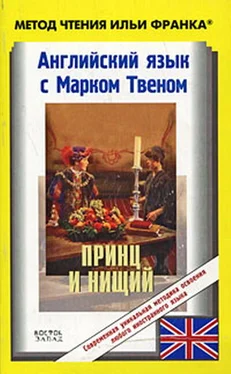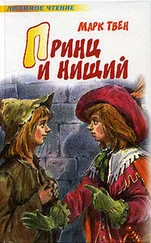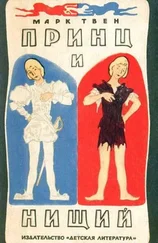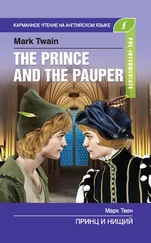injury [`ınGərı], default [dı`fO:lt], precedent [prı`si:dənt]
The king spoke — in a thoughtful, measured voice:
'Thou didst save me injury and shame, perchance my life, and so my crown. Such service demandeth rich reward. Name thy desire, and so it be within the compass of my royal power, it is thine.'
This fantastic suggestion startled Hendon out of his reverie. He was about to thank the king and put the matter aside with saying he bad only done his duty and desired no reward, but a wiser thought came into his head, and he asked leave to be silent a few moments and consider the gracious offer — an idea which the king gravely approved, remarking that it was best to be not too hasty with a thing of such great import.
Miles reflected during some moments, then said to himself, 'Yes, that is the thing to do — by any other means it were impossible to get at it — and certes, this hour's experience has taught me 'twould be most wearing and inconvenient to continue it as it is. Yes, I will propose it; 'twas a happy accident that I did not throw the chance away.' Then he dropped upon one knee and said:
'My poor service went not beyond the limit of a subject's simple duty, and therefore hath no merit; but since your majesty is pleased to hold it worthy some reward, I take heart of grace to make petition to this effect. Near four hundred years ago, as your grace knoweth, there being ill blood betwixt John, king of England, and the king of France, it was decreed that two champions should fight together in the lists, and so settle the dispute by what is called the arbitrament of God. These two kings, and the Spanish king, being assembled to witness and judge the conflict, the French champion appeared; but so redoubtable was he that our English knights refused to measure weapons with him. So the matter, which was a weighty one, was like to go against the English monarch by default. Now in the Tower lay the Lord de Courcy, the mightiest arm in England, stripped of his honors and possessions, and wasting with long captivity. Appeal was made to him; he gave assent, and came forth arrayed for battle; but no sooner did the Frenchman glimpse his huge frame and hear his famous name but he fled away, and the French king's cause was lost. King John restored De Courcy's titles and possessions, and said, "Name thy wish and thou shalt have it, though it cost me half my kingdom"; whereat De Courcy, kneeling, as I do now, made answerer, "This, then, I ask, my liege; that I and my successors may have and hold the privilege of remaining covered in the presence of the kings of England, henceforth while the throne shall last." The boon was granted, as your majesty knoweth; and there hath been no time, these four hundred years, that that line has failed of an heir; and so, even unto this day, the head of that ancient house still weareth his hat or helm before the king's majesty, without let or hindrance, and this none other may do. Invoking this precedent in aid of my prayer, I beseech the king to grant to me but this one grace and privilege — to my more than sufficient reward — and none other, to wit: that I and my heirs, forever, may sit in the presence of the majesty of England!'
'Rise, Sir Miles Hendon, knight,' said the king, gravely — giving the accolade with Hendon's sword — 'rise, and seat thyself. Thy petition is granted. While England remains, and the crown continues, the privilege shall not lapse.'
His majesty walked apart, musing, and Hendon dropped into a chair at table, observing to himself, ''Twas a brave thought, and hath wrought me a mighty deliverance; my legs are grievously wearied. An I had not thought of that, I must have had to stand for weeks, till my poor lad's wits are cured.' After a little he went on, 'And so I am become a knight of the Kingdom of Dreams and Shadows! A most odd and strange position, truly, for one so matter-of-fact as I. I will not laugh — no, God forbid, for this thing which is so substanceless to me is real to him. And to me, also, in one way, it is not a falsity, for it reflects with truth the sweet and generous spirit that is in him.' After a pause: 'Ah, what if he should call me by my fine title before folk! — there'd be a merry contrast betwixt my glory and my raiment! But no matter; let him call me what he will, so it please him; I shall be content.'
CHAPTER XIII (Глава тринадцатая)
The Dissappearance of the Prince (Исчезновение принца)
A HEAVY drowsiness presently fell upon the two comrades (тяжелая дремота вскоре упала на двух товарищей). The king said (король сказал):
'Remove these rags (сними эти лохмотья; to remove — удалять)' — meaning his clothing (имея в виду свою одежду).
Hendon disappareled the boy without dissent or remark (Хендон раздел мальчика без несогласия или замечания), tucked him up in bed (укутал его в кровати; to tuck up — заботливо укрыть, подоткнуть одеяло), then glanced about the room (затем оглядел комнату), saying to himself, ruefully (говоря себе уныло), 'He hath taken my bed again, as before (он занял мою кровать снова, как раньше; to take — брать) — marry (черт побери), what shall I do (что я буду делать)?' The little king observed his perplexity (маленький король заметил его замешательство), and dissipated it with a word (и рассеял его одним словом). He said, sleepily (он сказал сонно):
'Thou wilt sleep athwart the door, and guard it (ты будешь спать поперек двери и охранять ее; wilt — устар. вместо will).' In a moment more he was out of his troubles (через еще одну секунду он был вне своих тревог), in a deep slumber (в глубоком сне).
'Dear heart (Боже мой: «дорогое сердце»), he should have been born a king (он должен был быть рожден королем; to be born — родиться)!' muttered Hendon, admiringly (пробормотал Хендон восхищенно), 'he playeth the part to a marvel (он играет свою роль идеально : «к чуду»).'
Then he stretched himself across the door (затем он вытянулся поперек двери), on the floor (на полу), saying contentedly (говоря удовлетворенно):
'I have lodged worse for seven years (я живал хуже в течение семи лет); 'twould be but ill gratitude to Him above to find fault with this (было бы плохой благодарностью Ему наверху = Богу, находить что-то неправильное в этом).'
He dropped asleep (заснул: «упал спящий») as the dawn appeared (когда рассвет появился). Toward noon he rose (ближе к полудню он поднялся; to rise — вставать), uncovered his unconscious ward (раскрыл = снял одеяло со своего бессознательного = спящего подопечного) — a section at a time (одна часть за один раз = приподнимая одеяло по частям) — and took his measure with a string (и снял с него мерку бечевкой; measure — мера). The king awoke (король проснулся; to awake — просыпаться), just as he had completed his work (как только он закончил свою работу), complained of the cold (пожаловался на холод), and asked what he was doing (и спросил, что он делал).
Читать дальше
Конец ознакомительного отрывка
Купить книгу




![Марк Твен - Принц и нищий [Издание 1941 г.]](/books/148799/mark-tven-princ-i-nichij-izdanie-1941-g-thumb.webp)







